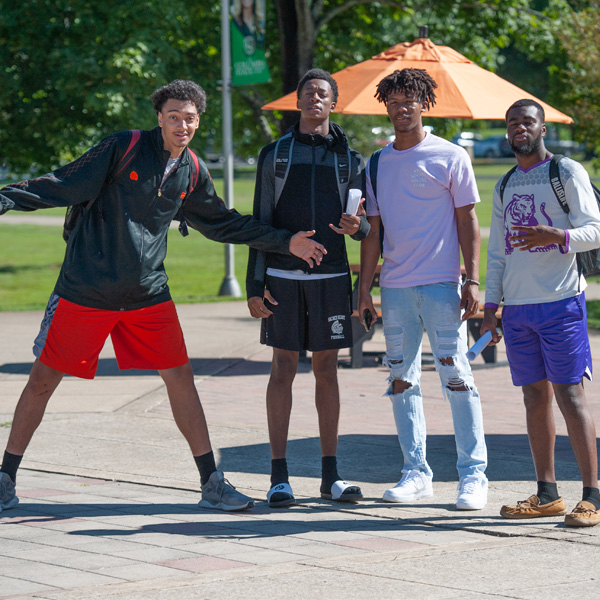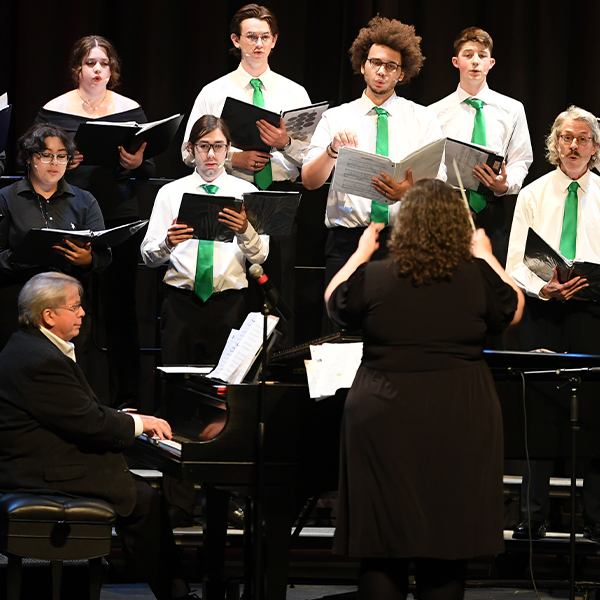Personal Safety
Personal safety is often a question of situational awareness and anticipation. The first step to avoid having your car broken into may just be remembering to leave no valuables visible in the back seat. To avoid a DUI? Don’t drink if you plan to drive. Thinking about what COULD happen is often the best way to make sure it doesn't.
- Develop a plan of action to use were you to be confronted or assaulted.
- Always lock the doors of your vehicle.
- Avoid walking alone, especially at night.
- Go with someone.
- Stay away from isolated areas.
- Try to stay near streetlights.
- Hold your purse or briefcase tightly, close to your body
- A front pocket is safer for a wallet than a back one.
- Dress sensibly. Tight pants, clogs, or heels make movement difficult.
- Cross the street or change directions.
- Keep looking back so the person knows you can't be surprised.
- Go to a well-lighted area. Enter a building hall, classroom, or library; anywhere there are people.
- Notice and remember as much as possible about the person so you can give a good description later.
- Don't resist. No amount of money is worth taking chances with your life.
- Notify the campus police or local police immediately. Try to give a description that includes approximate age, height, weight, and details on hair, clothing, jewelry, scars, and tattoos - anything that is noticeable.
- Keep your doors and windows locked day and night.
- Don't let strangers in.
- Don't leave a door unlocked for someone planning to come back later.
- Lock your door every time you leave.
- Engrave expensive equipment and valuables with an I.D. number. Engraving tools are available for your use at the Campus Police Department.
- Don't store your purse in an unlocked desk drawer.
- Don't leave your belongings unattended in libraries, hallways, locker rooms, or classrooms.
- Keep your office door locked.
- Lock all doors behind you when entering or exiting at night.
- Keep doors locked while driving.
- Don't pick up hitchhikers.
- Check the back seat before getting into a car.
- Always lock your car and take the keys.
- Lock valuables in the trunk. Park in well lighted areas.
- Don't hitchhike.
- Consider speaking with a friend or with a counselor available at the 24-hour Crisis and Support line at the Nashville Sexual Assault Center (1.800.879.1999).
- Additional support can be provided for students by contacting Counseling Services at 931.540.2572.
- Victims are encouraged to report incidents to the police even if they do not plan to prosecute. It is very difficult for the police or other community services to address problems that they are not aware that exist.
- Awareness and risk reduction are 90% of avoidance.
- Avoid mixing sexual decisions with drugs and alcohol.
Alcohol is the largest contributor of high-risk behaviors on college campuses. If you choose to drink alcohol, you assume the responsibility of dealing with the possible negative consequences.
- Drink in a safe environment with people you know.
- Know your limit and drink in moderation.
- Remember, if you are not 21 years of age, it is illegal to consume or possess alcohol.
When on spring break, it’s always good to be safe and alert.
- Check your local police stations in the area to know where to go and what areas to avoid.
- When traveling, always carry a form of identification with you.
- Keep your cell phone on you and make sure it is fully charged.
- Watch your drinks at all times when around people you do not know or trust—yes even if you are male. Avoid consuming large amounts of alcohol/drugs as they can disrupt your perceptions and decision-making skills
- The legal drinking in the United States is 21 years of age. If going outside of the country be sure to check what the legal drinking age is and be familiar with the laws of the country.
- Be aware of your surroundings and travel in groups.
Theft is the most reported crime on college campuses, but it is also primarily a crime of opportunity.
You can greatly reduce your chance of being victimized by following simple theft-prevention strategies:- Make sure your vehicle is locked when you leave it.
- Personal items left in the vehicle should not be left where they are visible.
- At night, walk to your car with a friend.
- Remember, your backpack carries your books, class notes, calculators and even laptops. Do NOT leave it unattended.
- Our campuses are open to the public. Never assume that someone is a staff or faculty member (or even a fellow student) unless they have a Columbia State photo ID.
- Immediately report any suspicious persons or activity to the police and to the campus security.
If you suspect an individual may become violent:
- Call 911.
- Try to calm the person down, but don’t threaten.
- Maintain an escape route and distance if a weapon is present.
If you encounter an already violent situation:
- Evacuate and call 911. If you are unable to leave, seek shelter inside the building preferably behind a locked door in a room without windows.
Signs of distressed students or employees:
(Notify campus security, counseling staff, extended campus directors, or the associate vicepresident of student services if you notice one or more of these behaviors.)
- excessive unexplained absence
- changes in behavior, hygiene or appearance
- threats made against other individuals
- threats of suicide
- excessive or inappropriate anger
- substance abuse
- expressing unusual thoughts or exhibiting unusual behavior
- plotting violence
- behavioral or emotional changes
- fascination with weapons
- withdrawal
Best practices for handling employment actions:
- Partner with the counseling center as you prepare to take actions, which are corrective or disciplinary in nature.
- Have another supervisor in the room as a witness.
- If there is a past history of volatile behavior, campus security personnel can be nearby during difficult meetings such as terminations.
- Give consideration to the day of week/time of day for a difficult meeting to reduce the number of people who are potentially exposed.
- Consider the location of a difficult meeting. If there is concern about volatile behavior, choose a private room with more than one exit.
- For a difficult meeting, pre-screen the individual for behavior. Pre-screening involves the support staff greeting the individual and observing if there are any concerning behaviors upon arrival or departure.
- Provide a cooling off period for employees who get angry or very upset during a meeting. Stop the meeting and consider paid administrative leave for 24-48 hours and a follow-up meeting.
Important Numbers
Security
- 931.540.2700 (When using a campus phone, dial last 4-digits.)
Inclement Weather Line
- 931.540.2515
TDD Relay Number
- 1.800.848.0298
Police (Emergency)
- 911
Ambulance
- 911
Fire Department
- 911
Columbia Power & Water
931.388.4833 or
931.388.5616 after 5 p.m.
ATMOS Energy (Gas)
1.800.566.5469
Maury Regional Medical Center
1114 W. 7th St.
Columbia, TN 38401
931.381.1111
Williamson County Medical Center
4321 Carothers Pkwy.
Franklin, TN 37067
615.435.5000
Crockett Hospital
1607 S. Locust Ave.
Lawrenceburg, TN 38464
931.762.6571
Maury Regional Medical Center (Marshall County)
1080 N. Ellington Pkwy.
Lewisburg, TN 37091
931.359.6241
Wayne County Medical Center
103 Mangubat Dr.
Waynesboro, TN 38485
931.722.5411








